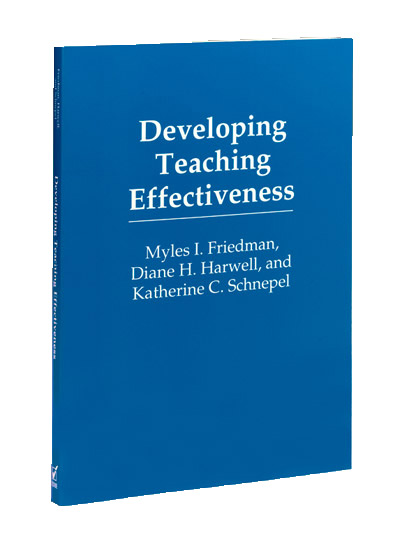
7" X 9" paperback
202 pages (book)
68 pages (manual)
( by Mail or Phone )
Audience
Purpose
Organization
Table of Contents
Guidelines for Making Instructional Decisions
Glossary
1. Effective Instructional Strategies
1. Taking Student Readiness into Account
2. Defining Instructional Expectations
3. Providing Instructional Evaluation
4. Providing Corrective Instruction
5. Keeping Students on Task
6. Maximizing Teaching Time
7. Providing Ample Learning Time
8. Providing Transfer of Learning Instruction
9. Providing Decision-Making Instruction
10.Providing Prediction and Problem-Solving Instruction
11.Providing Contiguity
12.Utilizing Repetition Effectively
13.Utilizing Unifers
14.Providing One-to-One Tutoring
15.Utilizing Reminders
16.Utilizing Teamwork
17. Reducing Student/Teacher Ratio Below 21 to 1
18.Clarifying Communication
19.Utilizing Question and Answer Instruction
20.Utilizing Computerized Instruction
21.Utilizing Demonstrations
II. Instructional Aids
22. Controlling Classroom Disruptions
23. Preschool Instruction
24. Enlisting Student Motivation
Appendix: Quiz Keys
About the Authors
Instructor's Guide
Instructor's Resources
Guidelines for Developing a Syllabus
Test Item Pool
Multiple-Choice Test Items for the 21 Effective Instructional Strategies
Multiple-Choice Test Items that Assess Multiple Strategies
Match Item Types
Sequencing Item Types
Term Paper Specifications
Term Paper Instructions
Term Paper Scoring Criteria
Teaching Observation Instrument
Observer Instructions
Scoring
Observations
References
Please consider these endorsements from respected educators.
Myles I. Friedman is a Distinguished Professor Emeritus of Education at the University of South Carolina and former CEO of the Institute for Evidence-Based Decision-Making in Education. A renowned educator and author, his books include Rational Behavior, Teaching Reading and Thinking Skills, Improving Teacher Education, Teaching Higher Order Thinking Skills to Gifted Students, Taking Control: Vitalizing Education, Ensuring Student Success, Improving the Quality of Life, and with Steven P. Fisher, Handbook On Effective Instructional Strategies. He spent more than 30 years conducting and applying research to improve education. Dr. Friedman's Master's and Ph.D. degrees in Educational Psychology were earned at the University of Chicago.
Diane Harwell, Ph.D., has an earned educational specialist degree and doctorate in Educational Administration from the University of South Carolina and Bachelor’s and Master’s degrees in English. She presently serves as Clinical Associate Professor in the Department of Educational Leadership and Policies, University of South Carolina. During her 40 years in education, she has served as teacher, assistant principal, district consultant for curriculum and instruction, and coordinator of school improvement, professional development, and leadership training at the South Carolina Department of Education. She serves as a consultant to help schools improve their instructional programs and teachers enhance their teaching skills.
Katherine C. Schnepel is a self-employed research and measurement consultant. She has earned Master's and Doctorate degrees in Educational Research and Measurement and a Bachelor's degree in Psychology. She has served as an adjunct professor in the Departments of Educational Psychology and Educational Leadership and Policy, University of South Carolina. She has made presentations on testing and measurement and mastery learning and has been employed as a research and measurement specialist at Richland School District One, Columbia, SC. Subjects she has taught include test item writing, interpreting test scores, measuring student achievement, and program evaluation.